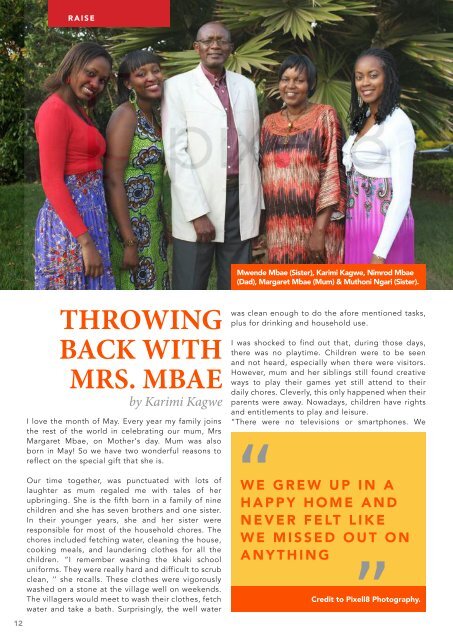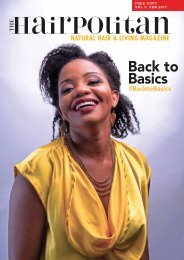THE HAIRPOLITAN MAGAZINE VOL 6 MAY 2017
Celebrating Mothers
Celebrating Mothers
You also want an ePaper? Increase the reach of your titles
YUMPU automatically turns print PDFs into web optimized ePapers that Google loves.
RAISE<br />
THROWING<br />
BACK WITH<br />
MRS. MBAE<br />
by Karimi Kagwe<br />
I love the month of May. Every year my family joins<br />
the rest of the world in celebrating our mum, Mrs<br />
Margaret Mbae, on Mother‘s day. Mum was also<br />
born in May! So we have two wonderful reasons to<br />
reflect on the special gift that she is.<br />
Our time together, was punctuated with lots of<br />
laughter as mum regaled me with tales of her<br />
upbringing. She is the fifth born in a family of nine<br />
children and she has seven brothers and one sister.<br />
In their younger years, she and her sister were<br />
responsible for most of the household chores. The<br />
chores included fetching water, cleaning the house,<br />
cooking meals, and laundering clothes for all the<br />
children. “I remember washing the khaki school<br />
uniforms. They were really hard and difficult to scrub<br />
clean, ’’ she recalls. These clothes were vigorously<br />
washed on a stone at the village well on weekends.<br />
The villagers would meet to wash their clothes, fetch<br />
water and take a bath. Surprisingly, the well water<br />
Mwende Mbae (Sister), Karimi Kagwe, Nimrod Mbae<br />
(Dad), Margaret Mbae (Mum) & Muthoni Ngari (Sister).<br />
was clean enough to do the afore mentioned tasks,<br />
plus for drinking and household use.<br />
I was shocked to find out that, during those days,<br />
there was no playtime. Children were to be seen<br />
and not heard, especially when there were visitors.<br />
However, mum and her siblings still found creative<br />
ways to play their games yet still attend to their<br />
daily chores. Cleverly, this only happened when their<br />
parents were away. Nowadays, children have rights<br />
and entitlements to play and leisure.<br />
“There were no televisions or smartphones. We<br />
“<br />
WE GREW UP IN A<br />
HAPPY HOME AND<br />
NEVER FELT LIKE<br />
WE MISSED OUT ON<br />
ANYTHING<br />
“<br />
Credit to Pixell8 Photography.<br />
would occupy ourselves with games of our own<br />
creation. We didn’t feel like we were poor or needy;<br />
we grew up in a happy home and never felt like we<br />
missed out on anything. My mum was a great story<br />
teller and would, whenever time allowed, tell us<br />
interesting stories which I remember to this day,”<br />
Mum expounds.<br />
There were advantages of being born into a large<br />
family, which came to be seen in the sharing out of<br />
duties. Her parents hired extra hands to work in the<br />
garden, but only as support staff. The children would<br />
all work together and be given rows of coffee for<br />
weeding, spraying insecticide and pruning. “Parents<br />
do not give children responsibilities as they used to<br />
like in our time,” Mum notes. Later, in her teenage<br />
years she went to a boarding high school while most<br />
of her siblings at that time were in a day school.<br />
“When I returned from boarding school it felt like<br />
payback time as I had to do all the chores because I<br />
had been away, it was my time to do the work!’’ she<br />
quips.<br />
In the coffee-picking season, they would at times be<br />
at the coffee factory late into the night. When they<br />
would return home, the boys would help to fetch<br />
water because of the lateness of the hour. They<br />
would then work together to cook the large ugali<br />
(a dish made from maizemeal). If a chicken were to<br />
be cooked for their large family, it would be just<br />
enough. Every morsel would be cooked, eaten and<br />
the nice pieces belonged to the grown ups. “To this<br />
day, I don’t like to eat the drumsticks because I grew<br />
up knowing that the two pieces belonged to my<br />
parents!” Mum shares.<br />
When the holidays came along, her mother would<br />
send the girls to a family friend’s home. They would<br />
be sent bearing gifts from the garden. However,<br />
because the destination was quite a distance<br />
away, they would spend the night at the home and<br />
return the next day. It was safer for children to walk<br />
unaccompanied, as there were no kidnapping cases.<br />
I note that this is in stark contrast to modern times.<br />
I ask her what her views are on the differences<br />
between raising children, then and now. She talks<br />
about smart phones being accessible to very young<br />
children; and if not monitored, it can lead to unwanted<br />
exposure to pornography and other societal vices.<br />
Mum highlights that even in the slum areas children<br />
can pay as little as Kes. 5/= to watch whatever they<br />
want as they are mostly on their own. “Nowadays we<br />
find both parents working and coming home late.<br />
They do not have as much influence on their children<br />
who are being raised by the media, the house helps<br />
and peers in school.”<br />
We wind down the interview with her remembering<br />
how they went to boarding school later in life. While,<br />
in this day & age, Mum’s heard of children being sent<br />
off when they are still very young. She feels it takes<br />
something away form the parent-child relationship.<br />
“Once they become teenagers it is harder to form a<br />
bond,” she adds.<br />
I’ve enjoyed listening to my mother sharing about<br />
her childhood but all she had to say couldn’t fit in<br />
this article. I left, deep in thought considering the<br />
demanding parenting journey ahead. There is truly a<br />
lot we can learn from the past.<br />
Mum later went on to work for decades in the<br />
education sector and is now retired. She now spends<br />
some of her time as a director at Koinoinia Education<br />
Centre.<br />
12 13








